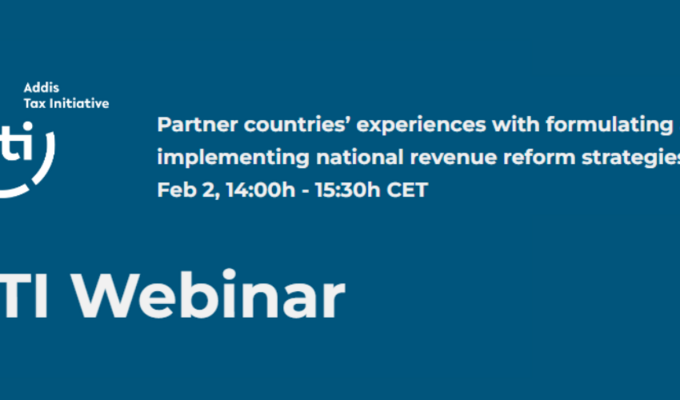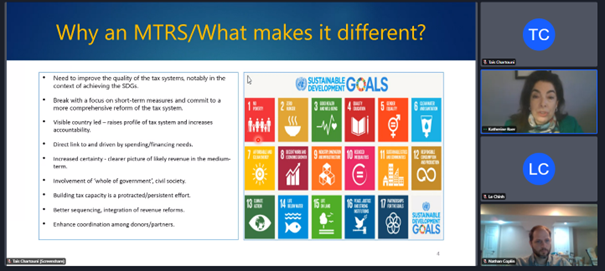ATI WEBINAR: PARTNER COUNTRIES’ EXPERIENCES WITH NATIONAL REVENUE REFORM STRATEGIES

Domestic Revenue Mobilisation (DRM) is a critical aspect of countries’ efforts to finance the spending needed to achieve the goals set out in the 2030 Agenda for Sustainable Development. Although the Sustainable Development Goals (SDGs) are increasingly being incorporated into national development strategies and plans, they have not been adequately resourced and supported. The fiscal implications of the pandemic have further increased the sense of urgency attached to DRM. It is therefore important that countries revise their revenue mobilisation strategies to be able to meet their financing needs on the path to achieving the SDGs.
Against this backdrop, the ATI organised the webinar “Partner countries’ experiences with formulating and implementing national revenue strategies”. The event, held on 2 February 2023, displayed experiences in the development and setting up of the Medium-Term Revenue Strategy (MTRS) and other types of national revenue reform strategies.
The webinar, was moderated by Mr. Nathan COPLIN, Oxfam’s Policy Advisor for Accountable Development Finance and co-coordinator of ATI Consultative Group 1. Representatives from the International Monetary Fund (IMF) and the Asian Development Bank (ADB), together with delegates from the tax administrations of Senegal and Vietnam, and inputs from the audience contributed to and broadened the exchange. The institutional and theorical dimensions on tax system reforms were interspersed with case studies, real-life examples, and lessons drawn from practice. An open interactive discussion and a Q&A session with the public wrapped up the webinar.
Medium-term tax system reforms: connecting an increase in DRM capacity, national development strategies, and the SDGs
Tax reform strategies are changes in the structure of taxes or the entire tax system aimed at improving its performance in order to meet its established goals. In this sense, Mr COPLIN, from Oxfam, set the scene by pointing out the political opportunity the MTRS represents to tackle issues and challenges related to the tax system. He also highlighted the essential role development cooperation plays in implementing these strategies.

Ms. Katherine BAER, from the IMF, presented the MTRS approach and its importance in carrying out effective country-owned DRM reforms. "A MTRS is a whole-of-government and inclusive approach to leading tax system reform”, she explained. A MTRS supports country’s development objectives by complementing national development plans. “It builds on a country’s ongoing efforts and institutions and takes the country-specific circumstances into account”, Ms BAER added. Her presentation concluded with a case study of Uganda’s efforts towards implementing a MTRS, supported by the IMF and the UK’s Foreign, Commonwealth & Development Office (FCDO, former DFID). Among the results, she noted an increase of GDP gains, an improvement of transparency, as well as clearer policy objectives.
The IMF recommendations and opportunities for Uganda’s tax system reform were followed by Senegal’s experience with formulating and implementing a MTRS. Mr Jean KONE, Coordinator of the Implementation Unit for MTRS of the Senegalese Ministry of Finance and Budget, presented his country’s medium-term reform, which aims at supporting the Plan Senegal emergent (PSE) by increasing tax revenues in 2021-2024. Senegal’s MTRS rests upon three pillars, namely, broadening the tax base, achieving digital maturity, and renewing the tax administration governance. The idea digitalising the tax system as a means to bridging the gap between taxpayers and tax administrations and, by doing so, increasing tax accountability and compliance, has been taken up in previous events organised by the ATI.


Mr KONE’s presentation, accompanied by his own reflections, lead to an insightful discussion among the attendees.
ADB’s work on the MTRS approach to Support Recovery and Development in Asia was later introduced by Mr Daisuke MIURA, Public Management Specialist of the finance institution. Compared to that of the OECD economies, he noted the low revenue gained from personal income taxes in the Asia-Pacific region, emphasising the need of improving DRM efforts to make it possible to advance the SDGs. Mr MIURA then introduced ADB initiatives such as the Asian Pacific Tax Hub (APTH) to address the challenges faced by countries in the region. Strategic policy dialogue, knowledge sharing and capacity building, technical assistance, and development coordination lay the foundations for ADB’s contributions to the formulation of MTRS in the Asia-Pacific region. The topic of tax reform through digital transformation was brought up again by ADB’s representative, placing digitalisation at the forefront of the discussion around tax system reforms.
The panellists' presentations elicited an open discussion among the public, which included the presentation of challenges experienced by Rwanda in pursuing key tax reforms that help the country get enough resources to fund the National Strategy for Transformation 1 (NST1). The need for flexibility in the implementation of MTRS, as well as the relevance of communication and consultation activities to make sure that civil society supports these reforms stemmed from Rwanda’s experience.

There are clear takeaways from the webinar: medium-term revenue strategies are a challenging political and technical process that require support at the highest level of the government combined with technical and financial assistance from donors and stakeholders. It is therefore essential to develop a clear governance structure around the MTRS. Additionally, there is a growing emphasis on digitalisation mainstreaming in the formulation and implementation of these reforms.
The webinar underlined the top position of medium-term tax reform strategies within the intersection between tax and development. Contributions from experts and practitioners further evidenced the role MTRS can play in order to meet national revenue goals and other development objectives, including fulfilling national strategies as well as advancing the 2030 Agenda for Sustainable Development.
The Addis Tax Initiative
The ATI webinar “Partner countries experiences with formulating and implementing national revenue strategies” was organised within the framework of the ATI Consultative Group 1 which supports the implementation of Commitment 1 of the ATI Declaration 2025, in which ATI partner countries pledge to improve DRM based on equitable tax policies as well as efficient, effective and transparent administration.
The Addis Tax Initiative rests upon the vision of tax systems that work for people and advance the SDGs and aims to promote fair and effective domestic revenue mobilisation, policy coherence, and the social contract through partnerships and knowledge building.
Find the presentations delivered during the webinar here.